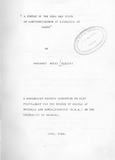| dc.description.abstract | This study set out to determine the need for
computers in libraries in Kenya, the image held
about computers by library staff and to establish
the extent of computerization in the country. The
survey for the study was conducted between 7th April
and 15th May, 1988.
The reviewed literature revealed that computers
have alleviated problems of inefficient systems,
eased the pressure caused by increased demand and
work load and have enabled libraries to give new and
varied services. It also indicated a trend towards
cooperation and development of networks in an attempt
to cope with the ever-increasing information in the
face of increasing costs. The literature also
revealed that computerization brings about a revolution
in the library set up. It has implications for the
whole fabric of the library. Being a growing technology
it has its own drawbacks and pitfalls which
should be taken into account. Hence there are varying
opinions on computerization. The current study was.
aimed at finding out the Kenyan librarians stand on
the issue.
The population of interest included all the
libraries in Kenya except primary and high school
libraries. The required information was collected
through the use of a structured questionnaire. One
hundred and two libraries completed the questionnaire
and this provided the information used in this report.
The findings of the study suggest that the needs
of Kenyan librarians are pressure of work, and the
need to 'offer new services and systems that are slow,
inefficient and cumbersome. Some libraries have turned
to computers to satisfy these needs while others are in
the process of doing so. The majority of the libraries,
however, are still struggling with their manual operations
and systems which were reported to be unsatisfactory in
the sense that they are slow and inefficient.
Regarding the views held about computers by
library staff it was shown that on the whole the image
is moderate to poor, especially among the majority who
fall in the non-computerized libraries category.
Concerning the extent of computerization, it
was found that eleven libraries had implemented
computerization. Most of these were special libraries.
However, there are forty one libraries which have
plans for computerization of some of their operations
and these fall in all the three categories, namely
special, academic and public libraries. The
functions which have been computerized or are
planned for computerization by most libraries
are information retrieval, cataloguing and
periodicals control.
In conclusion, it was found that library
cooperation in this area would receive overwhelming
support. | en |

